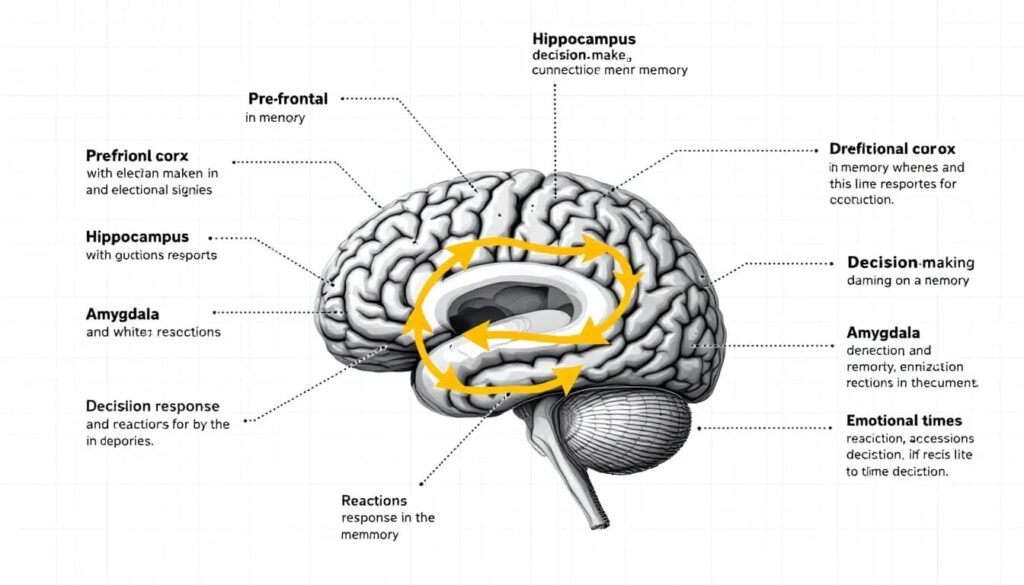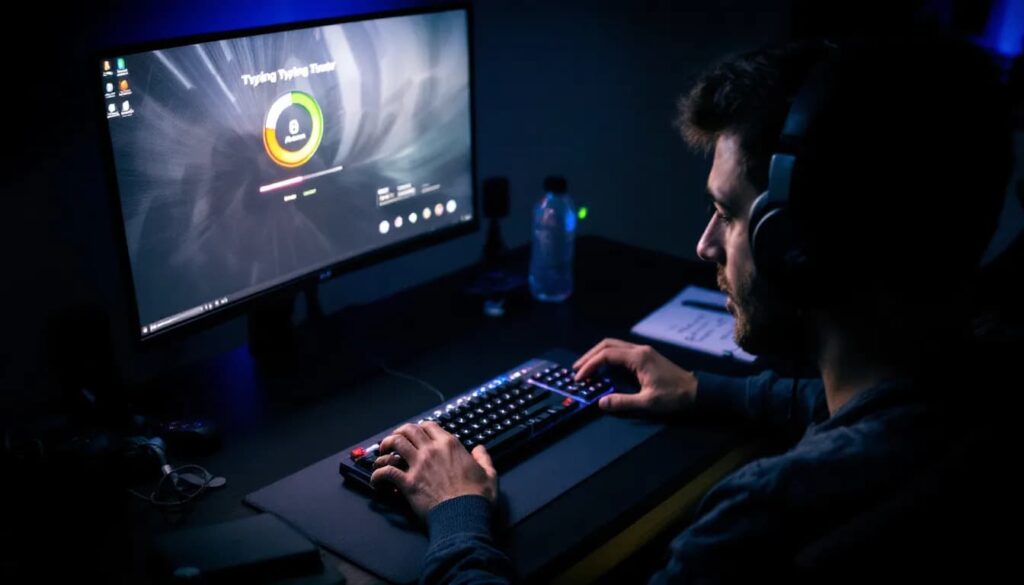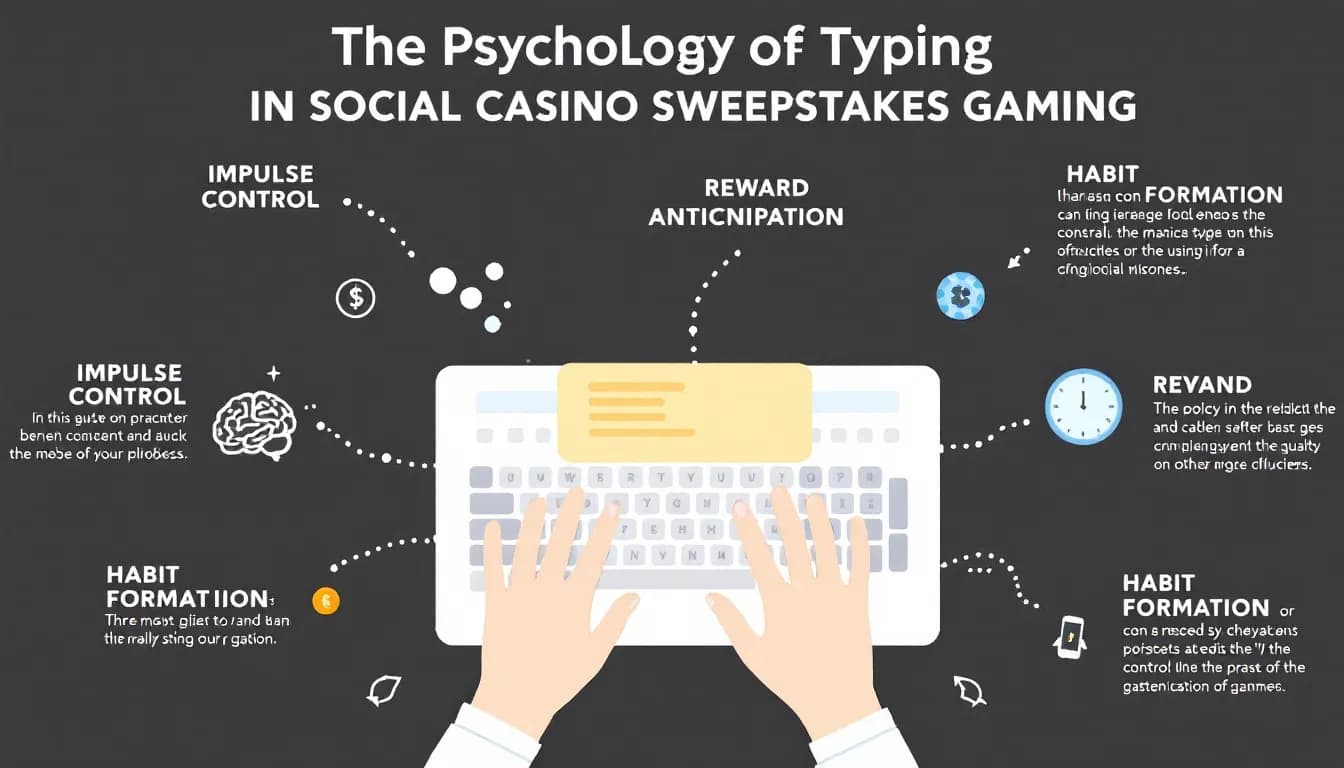Social casino sweepstakes gaming has become a popular digital pastime, combining the excitement of casino-style games with the accessibility of online platforms. Social casino gaming is a broader category that includes a wide range of gambling activities and is a significant and growing segment of the gambling industry, attracting millions of users worldwide. Casino games are a core component of social casino sweepstakes gaming, offering experiences similar to slots, poker, and roulette, and are often referred to as gambling games or casino gaming. Unlike traditional gambling, these games employ a sweepstakes model, enabling players to engage without risking real money while still offering opportunities for prizes. In this model, players do not wager real money, thereby distinguishing it from other forms of gambling activities. One often-overlooked factor in this environment is the role of typing speed and accuracy, which directly affects a player’s ability to participate efficiently.
The psychology of typing in social casino goes beyond simple mechanics. It involves a blend of cognitive, emotional, and behavioral elements that shape how players interact with the game. Gambling behavior in these environments is influenced by psychological principles, such as reinforcement patterns and cognitive biases, which can affect how players respond to rewards and challenges. These gaming environments can also impact mental health, increasing the risk of behavioral addictions and gambling disorder for vulnerable individuals. Clinically, problematic engagement in these games may be recognized as an addictive disorder, and can lead to gambling addiction for some players. From reaction times and concentration to stress responses and competitiveness, typing reflects both the mind and body working in sync. Understanding this psychology not only helps players perform better but also sheds light on how gaming environments, including online games and other forms of gambling, influence human behavior. For some, these influences can contribute to the development of a gambling problem.
The Role of Typing in Sweepstakes and Social Casino Games
Typing may seem like a background skill, but in sweepstakes gaming, it can be a deciding factor in performance. A player who types quickly and accurately can enter contests, respond to prompts, and engage in chat-based features much faster than others. Sweepstakes gaming often simulates a gambling experience, offering a variety of game types, including slots, poker, and other casino games. Platforms like Sweeps Casino Sixty6 highlight how smoother gameplay minimizes frustration caused by errors or delays. Additionally, players who frequently engage in sweepstakes gaming may develop specific habits or strategies that enhance their performance. Playing social casino games involves a combination of skill and chance, further engaging players in the process. When using chat-based features, social gaming plays a significant role in fostering player interaction and community.
In competitive sweepstakes environments, the speed of entry can influence perceptions of fairness. Gambling activity in these settings is also influenced by typing skill, as faster responses can lead to more opportunities and rewards. Players who struggle with typing might feel disadvantaged compared to those who type at lightning speed. This perception can affect motivation, engagement, and even overall enjoyment. For many, success feels tied not only to chance but also to personal skill—of which typing is a central part. However, it’s important to note that highly competitive or engaging sweepstakes environments can sometimes foster addictive behaviors, as players may become increasingly invested in improving their performance or winning. The element of risk and chance, including the gambles inherent in gameplay, adds to the excitement and potential for problematic behaviors.
Cognitive Processing and Reaction Times

The act of typing involves more than finger movements; it is a cognitive process deeply rooted in human behaviour. The brain must translate thought into keystrokes, coordinate motor skills, and maintain focus. In fast-paced sweepstakes gaming, this conversion speed can determine how quickly a player reacts to opportunities and makes critical decisions.
However, typing speed alone is not enough. Mental workload—the amount of mental effort required to process multiple inputs—can slow down performance. High cognitive load can exacerbate mental disorders and contribute to disordered gambling in vulnerable individuals. For instance, a player who is multitasking may type slower or make more errors, even if their base typing speed is high. Additionally, intermittent reinforcement—unpredictable rewards or wins—can increase cognitive load, as players remain alert and motivated by the possibility of random rewards, influencing how they approach typing tasks in sweepstakes gaming. This pattern is also observed in pathological gambling, which is clinically recognized in the Diagnostic and Statistical Manual as an addictive disorder. Effective sweepstakes gaming requires balancing cognitive load and motor performance to maintain both speed and accuracy.
Existing theories help explain the relationship between cognitive processing and gambling behaviors, providing a framework for understanding how these psychological mechanisms influence player engagement.
Emotional Factors and Player Behavior
Emotions heavily influence typing performance. Excitement can make players type faster, but it may also cause errors. Stress or time pressure might lead to “keyboard slips” where accuracy suffers. Psychological distress can further impair typing accuracy and performance, making it harder for players to maintain focus. On the other hand, mild adrenaline boosts can sharpen focus and enhance quick responses.
Competition adds another layer. Players who thrive under pressure may type more efficiently, while others may choke when the stakes feel high. For a problem gambler, emotional factors such as anxiety or impulsivity can significantly exacerbate their difficulties, making it even harder to maintain control. In some cases, obsessive-compulsive behaviors may manifest, leading to repetitive or ritualistic typing patterns among certain players. This dynamic highlights the connection between player behavior psychology and typing outcomes. Emotional regulation is as important as mechanical skill when it comes to consistent sweepstakes performance, as poor regulation can contribute to gambling problems.
The emotional impacts of typing in sweepstakes gaming warrant further consideration in future research.
Typing Speed vs. Accuracy in Player Outcomes

While many players focus on typing as fast as possible, accuracy is equally important. A typo in a sweepstakes entry can invalidate the attempt, negating the benefits of high speed. Prioritizing speed over accuracy introduces risk factors such as increased error rates, which can significantly reduce the chances of a valid entry—paralleling the risks involved in betting, where making a bet or multiple bets without careful consideration can lead to losses. The optimal strategy is to balance speed with correctness, ensuring that entries are both fast and valid.
Motivation for accuracy is often driven by the desire to win money, much like the motivation found in lottery games and other forms of gambling, where players strive for a successful outcome. In digital environments, these risk-reward dynamics are also present in online betting and on online gambling sites, where participants must weigh speed, accuracy, and risk to maximize their chances.
To illustrate, consider the relationship between typing speed, error rates, and winning chances:
| Typing Speed (WPM) | Error Rate | Impact on Winning Chances |
|---|---|---|
| 40 WPM | 2% | Reliable, steady progress |
| 70 WPM | 6% | Faster but riskier |
| 100 WPM | 12% | Very fast, frequent errors |
| 120+ WPM | 18%+ | High risk, accuracy collapse |
As shown in the table, a higher risk of errors at greater speeds can lead to invalid entries and reduced chances of winning. The best outcomes often come from maintaining moderate speed with minimal errors, rather than prioritizing speed alone.
When considering optimal strategies, it’s essential to note that some players may continue to play despite frequent errors, hoping for eventual success—much like individuals who persist in placing bets in gambling environments, anticipating a win after a series of losses.
Flow State in Sweepstakes Gaming
Many players describe being “in the zone” when their typing feels effortless and immersive. This flow state occurs when skill and challenge are balanced, allowing players to focus entirely on the task. In sweepstakes gaming, typing fluency helps achieve this state by reducing interruptions caused by errors or hesitations. The immersive nature of gambling games, including sweepstakes and other digital formats, further contributes to this sense of flow. Slot machines, for example, use reinforcement mechanisms such as random ratio schedules and near misses to create highly immersive experiences that encourage continued play. However, when players become overly immersed, there is a risk of developing addictive behaviour, especially as new technologies like mobile phones and the prevalence of internet gambling make it easier to engage in sweepstakes and similar gaming activities for extended periods.
Flow enhances enjoyment, boosts performance, and creates a sense of timelessness during play. For sweepstakes gamers, achieving flow can mean faster and more accurate entries without the mental strain of consciously monitoring every keystroke; however, it can also increase the risk of problematic gambling if players lose track of time and overengage.
Personality Traits, Typing Psychology, and Problem Gambling
Not all players approach sweepstakes gaming in the same way. Personality traits influence how typing is experienced and performed, and the type of gambler—whether casual or competitive—can shape gambling behavior and susceptibility to risk. Competitive individuals often prioritize speed, pushing themselves to type faster under pressure. Meanwhile, patient and detail-oriented players may focus on accuracy, valuing consistency over raw speed. Young people may be particularly influenced by competitive environments in sweepstakes gaming, making them more susceptible to developing certain gaming habits early in their gaming experience.
Casual players often see typing as a minor element of gameplay, whereas competitive sweepstakes gamers treat it as a skill to master. For example, a case study of two player types—casual vs. competitive—reveals clear differences. Casual players are more likely to type at their natural pace and accept occasional mistakes, while competitive players often practice, track their speed, and seek methods to minimize errors. Problem gamblers may exhibit distinct behavioral patterns or tendencies, such as compulsive repetition or an excessive focus on performance. Pathological gamblers, in particular, display unique behavioral patterns and neurological responses that set them apart from recreational players.
More involved gamblers often invest significant time and effort in mastering typing skills to gain a competitive advantage. These distinctions demonstrate how typing becomes a reflection of one’s mindset and motivation in social casino environments, particularly on social media sites where social casino games are popular. Regulatory oversight by bodies such as the UK Gambling Commission and other gambling commissions plays a crucial role in monitoring these activities, particularly as they intersect with monetized gaming and in-game purchases. Additionally, competitive environments like sporting events and the rise of sports betting further promote gambling behaviors within these platforms.
The present study explores these dynamics and has been published in an international journal, providing a research-based perspective on the relationship between personality, typing, and gambling behaviors.
Improving Typing for Better Sweepstakes and Online Gambling Performance
Players who want to improve their sweepstakes outcomes can benefit from refining their typing skills. Since both speed and accuracy matter, strategies should target efficiency and focus. Reward mechanisms, such as loot boxes in digital games, can reinforce skill development by providing chance-based incentives that motivate continued practice.
Effective methods include:
- Typing practice apps that provide drills, real-time feedback, and progress tracking.
- Mindfulness techniques to reduce stress and improve focus during gameplay.
- Ergonomic setups with comfortable keyboards and posture alignment to reduce fatigue.
- Chunking techniques, where players group information to type in logical segments rather than letter by letter.
Other research supports the use of typing practice apps and mindfulness techniques for enhancing both performance and focus in gaming contexts. Improved typing skills can also be applied to social casino gaming, where quick and accurate input can improve overall performance. Additionally, playing social casino games can serve as a way to develop both typing and gaming skills simultaneously.
These strategies enhance not only mechanical skill but also cognitive performance in gaming, resulting in more consistent outcomes. Gambling studies have shown that skill development can positively impact mental and behavioral outcomes, further supporting the benefits of improved typing skills. However, it is essential to note that developing advanced typing skills may potentially encourage some players to engage in online gambling, underscoring the importance of awareness of associated risks.
Gamification of Typing Practice
Interestingly, typing itself can be gamified to make practice more engaging. Mini-games, leaderboards, and challenges transform typing from a chore into an enjoyable skill-building activity. Incorporating rewards at random intervals, similar to those found in gaming and gambling contexts, can further boost engagement by tapping into psychological reinforcement mechanisms. When players use these methods, the improvements directly transfer to sweepstakes gaming performance.
For example, a player who enjoys competitive typing challenges may see increased speed and accuracy under pressure. Experiencing near-miss moments—such as almost beating a high score—can motivate players to keep improving, much like the effect seen in slot machine games. This not only prepares them for in-game scenarios but also trains their brain to stay calm and focused during stressful moments.
FAQ
What is the role of typing in social casino sweepstakes gaming?
Typing impacts a player’s ability to enter sweepstakes quickly and accurately. It directly affects engagement, efficiency, and competitive advantage in fast-paced environments.
Does faster typing always lead to better results?
Not necessarily. While speed can help, accuracy is equally important. High error rates reduce efficiency and can even invalidate entries.
Can typing psychology really impact sweepstakes outcomes?
Yes. A player’s mindset, stress levels, and confidence all influence typing performance, which in turn affects sweepstakes success.
How can I train my brain for faster, more accurate typing?
Regular practice with typing software, stress management techniques, and ergonomic setups can enhance both mental and physical typing efficiency.
Conclusion
The psychology of typing in social casino is a fascinating blend of cognitive processing, emotional factors, and behavioral patterns. From how quickly the brain translates thought into keystrokes to how emotions shape performance under pressure, typing is more than just a background skill—it’s a competitive advantage.
By understanding the balance between speed and accuracy, recognizing the role of personality traits, and adopting practical strategies for improvement, players can significantly boost their sweepstakes gaming performance. Studies on reaction times in gaming also show how cognitive speed and accuracy directly impact player outcomes in competitive environments.
Whether you’re a casual player or aiming to win big, understanding your typing psychology could be your edge in sweepstakes gaming. Practicing mindful typing, embracing flow, and treating skill-building as part of the fun can elevate both performance and enjoyment.



